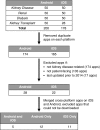Patients' and Nephrologists' Evaluation of Patient-Facing Smartphone Apps for CKD
- PMID: 30898873
- PMCID: PMC6450346
- DOI: 10.2215/CJN.10370818
Patients' and Nephrologists' Evaluation of Patient-Facing Smartphone Apps for CKD
Abstract
Background and objectives: Many aspects of CKD management rely heavily on patient self-care, including medication and dietary adherence, self-monitoring of BP, and daily physical activity. Growing evidence suggests that incorporating smartphone-based applications can support self-care in CKD and chronic disease more generally.
Design, setting, participants, & measurements: We identified applications targeting patients with CKD by conducting a search of the US Apple App Store (iOS) and Google Play Store (Android) using the following four phrases: "kidney disease," "renal," "dialysis," and "kidney transplant." We considered the first 50 applications for each search term on each application store. We adapted a previously described framework for assessment of mobile health applications to account for kidney disease-specific content areas and evaluated applications on their types of patient engagement, quality, usability, and safety. Engagement and quality were assessed by both a patient and a nephrologist, usability was assessed by a patient, and safety was assessed by a nephrologist. Overall, two patients with CKD and three nephrologists performed the evaluations. We examined pairwise correlations between patient, nephrologist, and consumer ratings of application quality.
Results: Our search strategy identified 174 unique applications on Android and 165 unique applications on iOS. After excluding applications that were not related to kidney disease, were not patient facing, or were last updated before 2014, 12 Android-only applications, 11 iOS-only applications, and five dual-platform applications remained. Patient and nephrologist application quality ratings, assessed by the net promoter score, were not correlated (r=0.36; P=0.06). Consumer ratings on the application stores did not correlate with patient ratings of application quality (r=0.34; P=0.18).
Conclusions: Only a small subset of CKD applications was highly rated by both patients and nephrologists. Patients' impressions of application quality are not directly linked to consumer application ratings or nephrologist impressions.
Keywords: Chronic Disease; Exercise; Malus; Methyltestosterone; Mobile Applications; Patient Participation; Renal Insufficiency, Chronic; Self Care; Smartphone; Telemedicine; blood pressure; chronic kidney disease; dialysis; end stage kidney disease; kidney; kidney transplantation; mobile health.
Copyright © 2019 by the American Society of Nephrology.
Figures


Comment in
-
Got CKD? There's an App for That!Clin J Am Soc Nephrol. 2019 Apr 5;14(4):491-492. doi: 10.2215/CJN.02350219. Epub 2019 Mar 21. Clin J Am Soc Nephrol. 2019. PMID: 30898874 Free PMC article. No abstract available.
-
Patient Perspective of Smartphone-Based Apps for CKD Self-Care.Clin J Am Soc Nephrol. 2019 Apr 5;14(4):483-484. doi: 10.2215/CJN.02220219. Epub 2019 Mar 21. Clin J Am Soc Nephrol. 2019. PMID: 30898875 Free PMC article. No abstract available.
References
-
- Aitken M, Gauntlet C: Patient Apps for Improved Healthcare: From Novelty to Mainstream, Parsippany, NJ, IMS Institute for Healthcare Informatics, 2013, pp 1–65
-
- IMS Institute for Healthcare Informatics : Patient Adoption of mHealth, Parsippany, NJ, IMS Institute for Healthcare Informatics, 2015, pp 1–63
-
- Quinn CC, Clough SS, Minor JM, Lender D, Okafor MC, Gruber-Baldini A: WellDoc mobile diabetes management randomized controlled trial: Change in clinical and behavioral outcomes and patient and physician satisfaction. Diabetes Technol Ther 10: 160–168, 2008 - PubMed
Publication types
MeSH terms
Grants and funding
LinkOut - more resources
Full Text Sources
Medical

